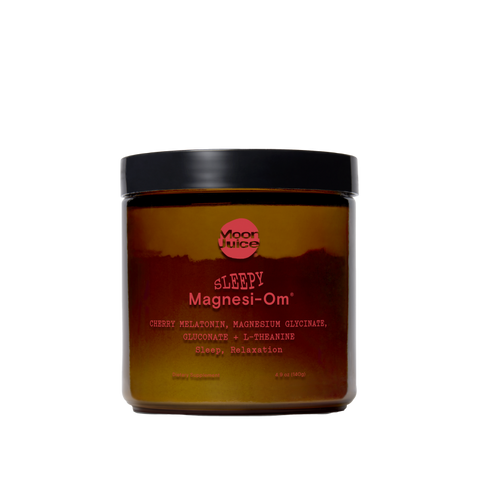It’s an hour or so leading up to bedtime. You’re busy making a list of all your to-dos for the next day, munching on a late-night snack, and scrolling on your phone as Netflix plays in the background. By the time you shut off your devices and crawl into bed, you find yourself tossing and turning, still very much in “on” mode despite longing for a deserved snooze sesh. If this scenario sounds familiar, it’s time to prioritize good sleep habits. First on the list: taking care to establish wind down time.
Ahead, discover why wind-down time is crucial yet underestimated in the quest for better sleep. Plus, the top tips and tricks worth including in your new and vastly improved regimen for winding down for the night.
What Is Wind Down Time?
Wind down time is the nighttime buffer period between wakefulness and sleep. It should include healthy habits that will help your mind and body default to “Do Not Disturb” mode after a long day tending to your personal and professional obligations.
In other words, wind-down time is when you unwind from your day and carry out a relaxing before-bed routine. If you currently have an inconsistent, scattered, or stimulating bedtime routine with lots of screen time, you’re likely winding up instead of winding down — hence why it’s taking you much longer than you’d like to fall asleep.
Why Wind Down Time is Crucial for Quality Sleep
Just as many of us (some chipper morning larks excluded) need some time to adjust after waking up to start our days with full steam ahead, it’s not so simple to switch from alertness to catching ZZZs at will. In order to fall asleep when you want to, you need to set up your mind and body for success, which will require a few important elements before you can switch to sleep mode.
For starters, it’s important to keep a consistent bedtime — yes, even on the weekends — since the body thrives on routine. Adhering to a consistent sleep schedule will help regulate hormones that dictate your circadian rhythm (aka sleep-wake cycles), with Melatonin, which is famously known as the sleep hormone, among them. The pineal gland produces Melatonin at night to signal to the body that it’s nearing time to rest. Conversely, if hormones such as cortisol, which is famously known as the stress hormone but is also associated with alertness, remain high close to bedtime, you’ll be closer to stimulation than sleepiness, which may prevent you from achieving healthy sleep.
Taking care to wind down before bed will help you ease your way into restfulness and let your mind and body know that shut-eye is imminent.
How Long Does It Take to Wind Down Before Bed?
Not everyone has the luxury of having hours all to themselves before bedtime. Fortunately, you don’t need too much time in the evening to successfully wind down before bed. According to a 2018 entry in the American College of Sports Medicine’s Health & Fitness Journal, even 30 to 45 minutes of a calming pre-bedtime ritual should be enough to help the brain ease into sleep by slowing down activity in the central nervous system.
If you have more time to spare, feel free to take it. However, the quality of your wind-down time may be more important than a few extra minutes logged so long as you can remain relaxed and present.
How to Create a Wind-Down Routine
Establish a Nightly Routine
Again, consistency is just as important as creating a calm atmosphere for your wind-down time. Sticking to the same nightly habits and behaviors will let your brain and body know that bedtime is approaching, which will promote relaxation and restfulness when it's time to unwind from your day.
Stick to an Official Wind Down Time
Just as you should keep a consistent bedtime, you should also aim to establish a certain time to begin your wind-down routine. Essentially, sticking to the same time one night after the next is a foolproof way to ‘train’ yourself and keep your sleep hygiene on track. To help you get in the pre-ZZZ groove, you can even set a nightly alarm with a soothing, restful melody to remind you to slow down and start your calming nightly rituals.
Create a Relaxing Sanctuary for Sleep
In addition to adopting healthy habits for your wind-down routine, creating the right bedroom environment is just as crucial for a good night’s rest. To create the most relaxing sleep sanctuary possible, aim to:
- Invest in comfortable bed furnishings
- Block all sources of light exposure (think: blackout curtains and covering or hiding all light from electronics in the bedroom)
- Create a cool bedroom environment by setting the thermostat to an ideal 60 to 67 degrees Fahrenheit
- Eliminate sources of noise pollution and/or turn on a white noise machine or app
Set a Digital Curfew for Better Rest
Putting down and/or powering off digital devices is one of the most effective ways to wind down for the night. Whether you’re watching your favorite show, texting your friends, or scrolling on social media, each of these screen time activities can spell trouble for achieving a good night’s sleep. After all, most of the content you’re consuming and the mediums of consumption are designed to be stimulating. Moreover, the blue light radiating from these digital devices throws your circadian rhythm off balance by suppressing Melatonin production.
In a 2023 study of 2,050 adult participants published in the journal Sleep Medicine: X, nighttime use of illuminated electronic devices demonstrated a negative effect on all sleep parameters measured — including sleep latency (i.e., the time it takes to fall asleep), sleep duration, and awakenings throughout the night.
Harvard Health advises against looking at screens 2 to 3 hours leading up to bedtime. If this window isn’t feasible, try to set a digital curfew for at least an hour before hitting the hay (or whenever you officially kick off your nighttime routine). Come nightfall, you can also:
- Dim screens
- Wear blue-light-blocking glasses
- Invest in a smartphone screen protector and/or an app to reduce blue light exposure
Choose Calming Activities That Foster Serenity
In lieu of stimulating activities like watching TV, scrolling on social media, and doing intense exercises too close to bedtime, opt for activities that allow you to tap into your parasympathetic nervous system (aka your “rest and digest” response).
You can tailor this part of your wind-down time to your liking. Choose whatever low-key self-care methods you enjoy and actually want to make time for, such as:
- Reading a book
- Journaling
- Meditating
- Yin yoga
- Gentle stretching
- Stargazing
- Listening to calming music
Embrace the Soothing Power of a Warm Bath or Shower
In case you prefer to bathe in the morning, you might want to reconsider a post-sunset splash for the sake of better sleep. A calming nighttime bathing ritual can be one of the simplest and most effective ways to wind down for the night.
In fact, a 2019 meta-analysis published in Sleep Medicine Reviews found that people who took a hot shower, bath, or foot bath 1 to 2 hours before bedtime benefited from:
- Shorter sleep latency
- Better sleep efficiency
- Improved subjective sleep quality
Want to make this practice for your wind-down time even more rewarding? Light a candle or two, listen to calming music, or incorporate soothing aromatherapy into the sensorial mix to shift your daily shower or bath from a mere necessity to peak luxury.
Incorporate Supplements for Enhanced Relaxation
Longing for fast, deep sleep but think it still seems unattainable no matter how solid your wind-down routine is? It’s worth trying out high-quality, natural sleep supplements that can enhance your relaxation on several fronts. While there are many vitamins and supplements for sleep on the market, melatonin and magnesium are some of the most popular because of their effectiveness.

Sleepy Magnesi-Om® is an all-natural melatonin and magnesium powder for sleep, formulated with 3 proven and powerful ingredients for sleep:
- Phytomelatonin (0.3mg) — a plant-based form of Melatonin (extracted from organic Alfalfa and Chlorella) that helps you fall asleep more quickly, lengthens total sleep time, and improves sleep quality
- Magnesium bisglycinate and magnesium gluconate (200mg) — chelated, non-laxative forms of the all-important mineral that support the body’s stress response and relaxation
- L-Theanine (200mg) — an amino acid that supports sleep quality and helps to unstress
While melatonin is perhaps the most ubiquitous sleep aid available, many people experience next-day melatonin grogginess from taking high-dose supplements (namely those from 5mg to 10mg), as they can take your natural hormone levels out of normal ranges. Sleepy Magnesi-Om® uses just 0.3mg of Phytomelatonin: a microdosing level that helps normalize and maintain — rather than overwhelm — natural Melatonin ranges. This clean and traceable form of the sleep aid facilitates restfulness without the next-day melatonin hangover. Simply mix 1 packet into 12 oz of water to make it a delicious part of your wind-down time for occasional sleepless nights.
Sources
- Claustrat B, Leston J. Melatonin: Physiological effects in humans. Neurochirurgie. 2015 Apr-Jun;61(2-3):77-84. doi: 10.1016/j.neuchi.2015.03.002. Epub 2015 Apr 20. PMID: 25908646. https://pubmed.ncbi.nlm.nih.gov/25908646/
- Markwald, Rachel R et al. “Behavioral Strategies, Including Exercise, for Addressing Insomnia.” ACSM's health & fitness journal vol. 22,2 (2018): 23-29. doi:10.1249/FIT.0000000000000375 https://www.ncbi.nlm.nih.gov/pmc/articles/PMC6715137/
- Cleveland Clinic, What’s the Best Temperature for Sleep? https://health.clevelandclinic.org/what-is-the-ideal-sleeping-temperature-for-my-bedroom
- Castro-Santos L, Lima MO, Pedrosa AKP, Serenini R, de Menezes RCE, Longo-Silva G. Sleep and circadian hygiene practices association with sleep quality among Brazilian adults. Sleep Med X. 2023 Oct 7;6:100088. doi: 10.1016/j.sleepx.2023.100088. PMID: 38162593; PMCID: PMC10757201. https://pubmed.ncbi.nlm.nih.gov/38162593/
- Harvard Health, Blue light has a dark side https://www.health.harvard.edu/staying-healthy/blue-light-has-a-dark-side
- Haghayegh S, Khoshnevis S, Smolensky MH, Diller KR, Castriotta RJ. Before-bedtime passive body heating by warm shower or bath to improve sleep: A systematic review and meta-analysis. Sleep Med Rev. 2019 Aug;46:124-135. doi: 10.1016/j.smrv.2019.04.008. Epub 2019 Apr 19. PMID: 31102877. https://pubmed.ncbi.nlm.nih.gov/31102877/
- Srivastava, Janmejai K et al. “Chamomile: A herbal medicine of the past with bright future.” Molecular medicine reports vol. 3,6 (2010): 895-901. doi:10.3892/mmr.2010.377 https://www.ncbi.nlm.nih.gov/pmc/articles/PMC2995283/
- Hieu TH, Dibas M, Surya Dila KA, Sherif NA, Hashmi MU, Mahmoud M, Trang NTT, Abdullah L, Nghia TLB, Y MN, Hirayama K, Huy NT. Therapeutic efficacy and safety of chamomile for state anxiety, generalized anxiety disorder, insomnia, and sleep quality: A systematic review and meta-analysis of randomized trials and quasi-randomized trials. Phytother Res. 2019 Jun;33(6):1604-1615. doi: 10.1002/ptr.6349. Epub 2019 Apr 21. PMID: 31006899. https://pubmed.ncbi.nlm.nih.gov/31006899/
- Cheah KL, Norhayati MN, Husniati Yaacob L, Abdul Rahman R. Effect of Ashwagandha (Withania somnifera) extract on sleep: A systematic review and meta-analysis. PLoS One. 2021 Sep 24;16(9):e0257843. doi: 10.1371/journal.pone.0257843. PMID: 34559859; PMCID: PMC8462692. https://pubmed.ncbi.nlm.nih.gov/34559859/














